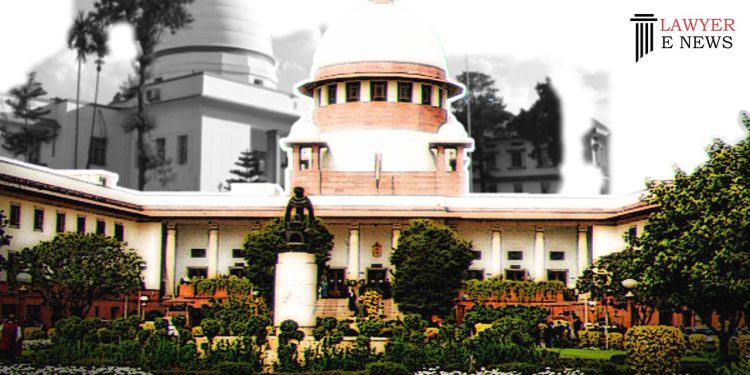Fundamental right to access justice threatened by narrow interpretation of Section 25 in North-East India – SC

The Supreme Court in a recent Judgement (SHAH NEWAZ KHAN & ORS. VS STATE OF NAGALAND & ORS. D.D. 28Feb2023) observed that Section 25 of the Code of Civil Procedure (CPC) should be interpreted in a fair, pragmatic, reasonable and realistic manner to avoid impeding “access to justice”, which is considered a fundamental right. They stated that a narrow interpretation of Section 25 imposing a bar for the entertainment of an application under Section 24 for transfer of a suit, appeal or other proceeding by a common High Court like the Gauhati High Court inter-se the four States in relation to which it exercises jurisdiction could place a heavy burden on litigants in the far-flung areas of the North-East.
FACTS
The question is whether the Supreme Court is the only authority empowered to direct the transfer of a lawsuit or appeal from a civil court in one state to a civil court in another state, as per Section 25 of the Code of Civil Procedure, or whether a common high court for multiple states may also consider and decide such an application for transfer under Section 24 of the CPC.
The appellants filed a lawsuit in the District Court of Dimapur, Nagaland in 2007 but failed to pursue it due to alleged hostile circumstances created by the private defendants. They applied to transfer the case to the District Court of Guwahati, Assam under section 24 of the CPC, but the Gauhati High Court rejected the application citing a previous decision. The appellants have appealed against the rejection and have also applied to the Supreme Court under section 25 of the CPC seeking the same relief.
Observed and Held
Supreme Court noted that numerous judicial authorities suggest that Section 25 of the CPC does not prevent a High Court from considering an application under Section 24 of the CPC, even for an inter-state transfer, if the High Court is a common High Court for two or more states and the transfer requested is not to a civil court outside the jurisdiction of that High Court.
The courts and tribunals in the States of Assam, Nagaland, Mizoram and Arunachal Pradesh are under the superintendence of the Gauhati High Court, and all district courts and subordinate courts in these states are subject to its control. Section 25 of the CPC is meant to ensure that no High Court transfers a case pending in a Civil Court in one state to a Civil Court in another state. The reason for this is that a High Court does not have the power to transfer a case to a Civil Court that is subordinate to another High Court. The Gauhati High Court cannot transfer cases to a Civil Court that is subordinate to a different High Court. In such cases, only the Supreme Court may order a transfer.
The Court held that while section 25 confers special powers on the Supreme Court to transfer cases between High Courts in different states, section 24(1)(b)(ii) allows the High Court to transfer cases to any subordinate court within its jurisdiction, even if that court is situated in a different state. The Court emphasizes that High Courts are as much a constitutional court as the Supreme Court and should not be denuded of their jurisdiction by the exclusive application of section 25 to inter-state transfers. The Court also notes that a common High Court, such as the Gauhati High Court, has the power to withdraw a civil suit from a court in one state and dispose of it itself, which, in effect, constitutes a transfer of the suit.
The Supreme Court observed that Section 25 of the Code of Civil Procedure (CPC) should be interpreted in a fair, pragmatic, reasonable and realistic manner to avoid impeding “access to justice”, which is considered a fundamental right. They stated that a narrow interpretation of Section 25 imposing a bar for the entertainment of an application under Section 24 for transfer of a suit, appeal or other proceeding by a common High Court like the Gauhati High Court inter-se the four States in relation to which it exercises jurisdiction could place a heavy burden on litigants in the far-flung areas of the North-East.
Supreme Court concluded that Section 25 of the CPC applies to inter-State transfers of a suit, appeal, or other proceedings where both States have a High Court in terms of Article 214 of the Constitution, and not to a transfer where both States have a common High Court under Article 231 thereof. They also stated that the power under Section 24 of the CPC can be exercised by the High Court even for inter-State transfers of a suit, appeal or other proceeding, if it is the common High Court for two or more States under Article 231 of the Constitution and both the Civil Courts (transferor and transferee) are subordinate to it.
The Supreme Court set aside the Gauhati High Court’s judgment and ordered them to dispose of the application under Section 24 of the CPC afresh on its own merits and dismissed the transfer petition under Section 25 of the CPC as it was rendered infructuous.
SHAH NEWAZ KHAN & ORS. VS STATE OF NAGALAND & ORS.





